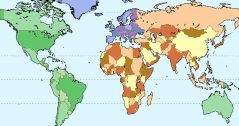|
|
| COMPANIES |
Discover the reality of companies and brands!
|
| TRANSNATIONALE.ORG |
| Free and independant information on large corporations |
Home >IndiaEconomy, tax incentives & labor conditionsThe hostile attitude of employers towards trade unions is clearly a deterrent to organising. Employers tend to either ignore the law making it illegal to dismiss a worker for their trade union activities or circumvent it by transferring workers to other locations to disrupt union activities or discourage union formation. Seeking justice through the judicial process is time consuming and costly. Unions report that some employers resort to intimidation, threats, demotion, beatings and, in extreme cases, death threats or even attempted murder against trade unionists. A more popular form of harassment, however, is the filing of false criminal charges.
Contractors and sub-contractors in the construction industry are loathe to allow workers to exercise their right to trade union membership, and are likely to threaten them with dismissal should they try. Since all work is project-based, the possibilities for engaging in collective bargaining are extremely limited.
Similarly, in the ship-breaking industry, employment is so precarious that workers do not try to enforce their right to organise trade unions. Anyone who even attempts to demand a wage increase is fired instantaneously. Intimidation is commonplace and the "muqadam", who is responsible for hiring and supervising the workers, sides more with the ship-breaker than with the workers.
New employment sectors such as call centres, the visual media and telecommunications are not covered by any explicit employment regulations and employers obstruct the formation of unions. High levels of casual employment were built into the structure of the call centre/business process outsourcing (BPO) industry, affecting many of the approximately 400,000 of these workers in India, and making it difficult for them to organise.
The majority of workers in the Export processing zones (EPZs) are women, employed in industries such as ready-made garments, electronics and software. In the Santacruz Electronics Export Processing Zone (SEEPZ) near Bombay, 90 per cent of the workers are women who are generally young and too frightened to form unions. Working conditions are bad and overtime is compulsory. Workers fear victimisation by management and those who protest are immediately sacked. It is common for workers to be employed by fictitious contractors on temporary contracts rather than directly by the company. In the Noida EPZ, workers have been sacked for demanding that labour laws should be implemented.
In practice, workers’ rights are only legally protected for the small minority who work in the organised industrial sector. Over 90 per cent of workers belong to the agricultural and informal sectors where there is almost no union representation, and where it is difficult to enforce legislation. The growing use of contract labour also creates problems for organising, and weakens the unions. Even governments are turning to contract labour.
Although the right to join trade unions and to bargain collectively exists in law, in reality entry to the zones is restricted to the workers, who are transported in by their employers. Since trade unionists are not able to enter, organising is extremely difficult and union activity rare in the Export processing zones. There are moves to exempt the zones from the application of labour laws. Some states, such as Andhra Pradesh, have even dissuaded labour departments from conducting inspections in the zones.
India creates 83 Special Economic Zones to attract foreign investment.
The Governement of India provides a 10-year tax holiday for
knowledge-based start-ups.
Free Trade Zone, also called Foreign-trade Zone or Free Port, are exempted from custom taxes. Investments in the Kandla, Santa Cruz, Falta, Madras, Cochin or Noida export processing zones benefit from a 5 years tax exemption of corporate tax.
Minimum wage noted (US$/day)
2007 1.3 US$/day at/for IKEA |
translate this page in arabic chinese dutch german japanese korean russian
Legal notice © T&C 1999-2010
| CONTRIBUTIONS |

